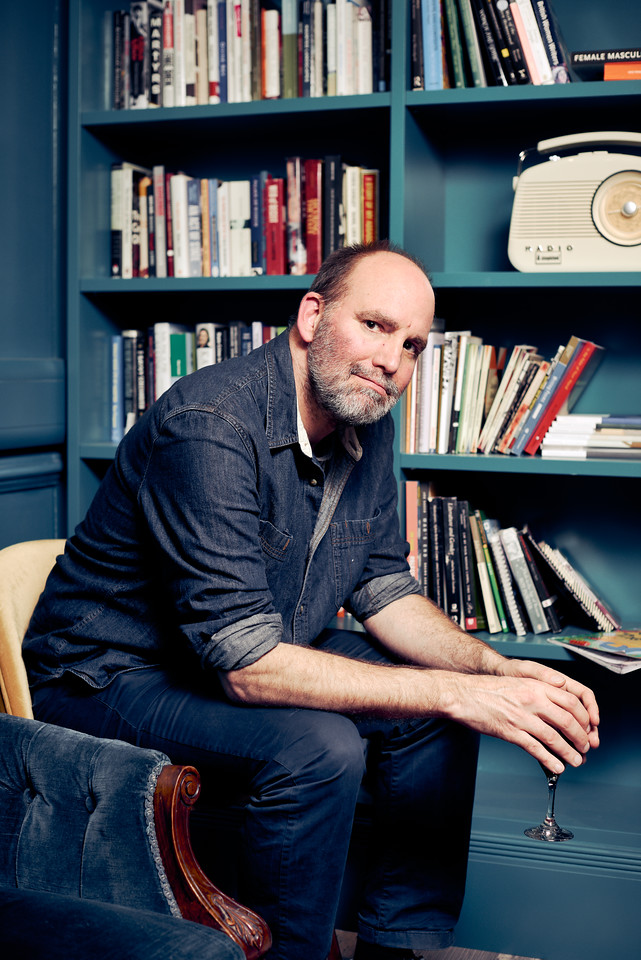Xan Brooks on Writing by Charlotte Rayment
Photo by ©Harry Lawlor/Mayn Creative
How can a career in journalism help when writing a novel? I sat down with Xan Brooks, award-winning writer, editor and broadcaster, and our 2019 Writer in Residence, to hear his thoughts on the subject.
Xan has had a colourful career in journalism so far; in his youth, he was part of the founding editorial team of the Big Issue magazine, after which he joined The Guardian as an Associate Editor. Since then, he has released an acclaimed debut historical fiction novel, The Clocks In This House All Tell Different Times.
With his background in journalism and his experience of writing and publishing a novel, Xan is in a unique position to see how the two disciplines can connect.
“I suppose in the course of my journalism career I’ve done pretty much every kind of writing that you could imagine,” Xan told me. “Some stuff that I’m proud of, lots of stuff that I’m not. But the full gamut from feature writing to interviews, to reviews, to news stories, to comment pieces, to blogs, to live blogs…the whole thing.”
Xan explained that in the journalism industry, you’re “working in a very pressurised environment, where you have to file to deadline and quickly, every day.”
The skills that he grew from that experience – the ability to churn out work quickly – “has been a really important discipline”, one that can be applied to other types of writing. Arguably, this skill could be applied to any form of creative work.
“I think that there’s an issue for every aspiring writer, everyone who wants to write a great book or a great story or a great collection of poetry,” Xan said, “that it’s the shining city on the hill. It’s the holy grail. It’s this cherished, noble, magical pursuit. And if you think like that, you’re dead. You’re never going to do it.”
Why? “Because it’s never going to be as good as you think it’s going to be. You spend ages dancing around it, working up the courage to approach it, by which time the idea has probably gone a bit stale.”
“There’s a lot to be said for a background in journalism, because journalism demystifies it all,” Xan explained. “It makes you think, ‘you’re only as good as what you can write quickly’ and hopefully you’ll have time to polish it later on.”
Part of Xan’s aim for his teaching during his residency has been to demystify writing.
“When you work in journalism, you know that a lot of the most successful journalists really aren’t the great writers but they’re great journalists because they just crank it out and do it day after day,” he said. “These people aren’t superhuman demi-gods who turn out masterpieces. They’re flawed, stumbling people who just do the best they can. If there’s any one message I can bring to students, it’s that: we’re all just muddling through.”
When we think of the great writers, do we imagine them cranking out mediocre work every day? Or do we romanticise them as literary idols, demi-gods, as Xan puts it?
“We build up writing too much,” Xan told me. “And I say that as somebody who loves great writing more than anything else and reveres great writers more than anyone else. But I still think there’s a danger of putting it on a pedestal and prostrating ourselves on the altar of great writing.”
“It’s the old cliché of nine-tenths of success is just showing up. The equivalent of that in writing is just writing something. Just delivering something,” he added.
So, if it’s a case of just writing something, how does one become a great writer?
“Great writing is only great writing because someone has done a lot of crap writing to get there,” Xan said. “And they’ve done crap writing for years and years and years. There’s an honour in that. There’s an honour in that graft.”
Xan added that he knows some published authors who are terrible writers and “unpublished writers who are absolute geniuses and are absolutely brilliant.”
At the end of the day, it’s about graft. Getting the words down on paper. Once they’re there, it’s just a matter of editing and polishing it up, before sharing it with the world.
Have courage, be yourself and just do it, basically. Stop worrying about it being perfect, take a leaf from a journalist’s book, crank it out, then make it shiny later.
by Charlotte Rayment

